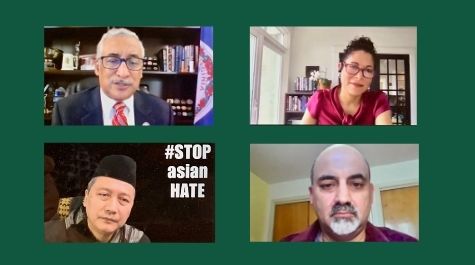Congressman Scott Outlines Path to Equality in Community Conversation
Congressman Robert C. “Bobby” Scott spoke about efforts to redress longstanding racial and economic inequality and systemic racism in the United States during a virtual conversation on April 8 with students, faculty, staff and other members of the local community. The event was sponsored by the William & Mary Center for Racial & Social Justice, the Asian Pacific American Law Students Association, and the Black Law Students Association.
A number of faculty welcomed Scott and the audience to the event including A. Benjamin Spencer, dean of William & Mary Law School; Vivian Hamilton, director of the William & Mary Center for Racial & Social justice; and Professors Francis Tanglao Aguas and Deenesh Sohoni, co-chairs of the Asian Centennial at William & Mary. Tolulope Olaniyan, a third-year law student, coordinated questions from the audience.
The event was part of the ongoing observance of the Asian Centennial at William & Mary. The Centennial commemorates the enrollment in 1921 of Pu-Kao Chen, Class of 1923, who is believed to be the first student of Asian descent and the first international student of color to attend William & Mary.
Aguas said the centennial offers the opportunity for celebration and reflection, and also is “envisioned to be a platform to enhance the dialogue for diversity, social justice, inclusion, race, and racism at William & Mary.”
Scott, who is himself Afro-Filipino, told the audience that the discussion came “at a difficult time for our democracy.” The pandemic has “disproportionately affected minority communities and exposed systemic inequalities, not only in healthcare, but in education, employment, criminal justice, policing, housing, and a lot of other areas,” he said.
Scott has represented Virginia’s third congressional district in the U.S House of Representatives since 1993. He has the distinction of being the first African American elected to Congress from Virginia since Reconstruction and is also the first American with Filipino ancestry to serve as a voting member of Congress.
He sounded a warning that white supremacy and racial violence will smolder and continue to spread if ignored. The anti-Asian rhetoric of some American politicians and pundits has fueled a rising tide of hate crimes since the start of the pandemic, he said. Such rhetoric contributed to the mass shooting in Atlanta in March that killed eight people, including six women of Asian descent. Those murders were evidence, he said, “of the forces of discrimination and sexism that have been allowed to grow in our country and that have been given a platform by certain elected officials who are supposed to be looking out for the safety and security of all their constituents.”
Scott spoke about ongoing, multi-pronged efforts he has championed in areas such as education, housing, healthcare and employment to dismantle inequalities. Congress’s ability to make progress in other areas such as criminal justice reform is not impossible, he said. But, he stressed, the “threshold question” is if we are going to “follow the evidence and research … or codify simple slogans and soundbites.” He noted that the American Rescue Plan Act of 2021 sought to quickly address the disproportionate toll of the pandemic on lower-income people and children, and contained provisions, for example, that made the COVID-19 vaccine free of charge to everyone in the country and provided funding to schools to ensure they could safely reopen.
He fielded questions from the audience asking for his perspective on a range of issues, including the George Floyd Justice and Policing Act and calls to defund the police, D.C. statehood, student loan forgiveness and the ability of the Democratic Party to energize voters.
Scott said it truly makes a difference who you elect to public office and how they vote. He quoted Dr. Martin Luther King, Jr., who said that “the arc of the moral universe is long, but it bends toward justice.” But, Scott, cautioned the audience, “also don’t forget that it doesn’t bend by itself.”
About William & Mary Law School
Legal education in a university setting began at William & Mary in 1779. Now in its third century, America's first law school continues its historic mission of educating citizen lawyers who are prepared both to lead and to serve.
